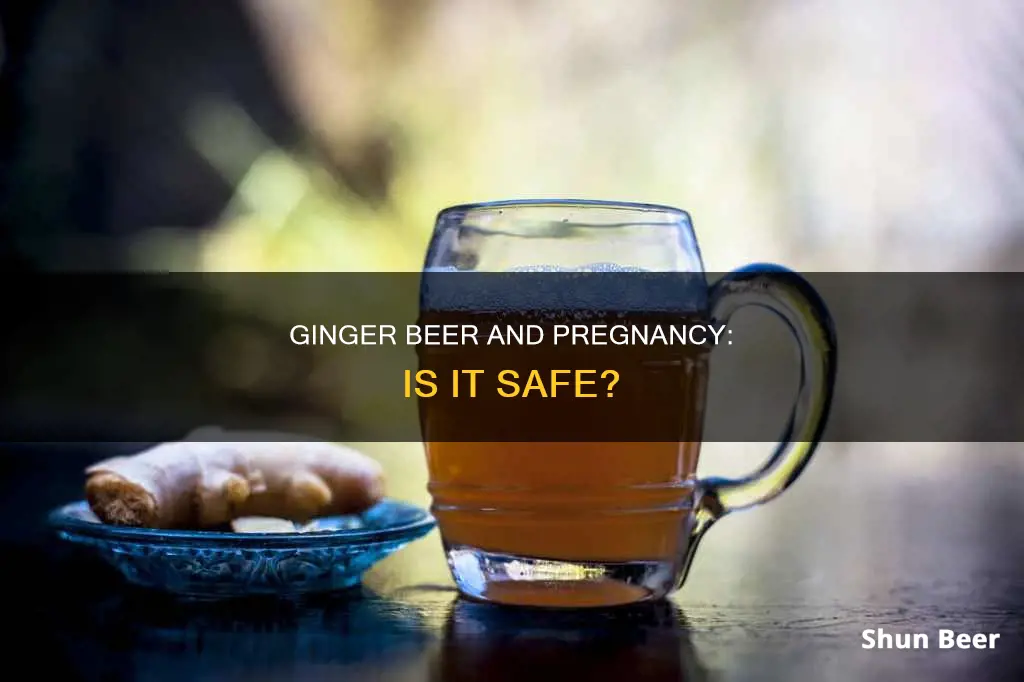
Ginger beer is a name given to a variety of beverages. While alcoholic ginger beers should be avoided during pregnancy, non-alcoholic ginger beers are perfectly safe for pregnant women to consume. In fact, ginger is a natural anti-nauseant and a popular remedy for pregnancy-related nausea. However, it is important to consume non-alcoholic ginger beer in moderation, as it is high in calories and low in nutrients, which can lead to unhealthy weight gain during pregnancy.
| Characteristics | Values |
|---|---|
| Alcoholic ginger beer | Unsafe for pregnant women |
| Non-alcoholic ginger beer | Safe for pregnant women |
| Ginger | Natural anti-nauseant |
| Sugar | High-calorie content |
| Artificial sweeteners | Not proven safe for use during pregnancy |
What You'll Learn
- Non-alcoholic ginger beer is safe to consume during pregnancy
- Alcoholic ginger beer is not safe to consume during pregnancy
- Ginger is a natural remedy for nausea
- Ginger beer is high in calories and low in nutrients
- Artificial sweeteners in ginger beer have not been proven safe for consumption during pregnancy

Non-alcoholic ginger beer is safe to consume during pregnancy
Ginger beer is a broad term for a variety of beverages. Non-alcoholic ginger beers are simply ginger-flavoured sodas, similar to ginger ale. Alcoholic ginger beers, on the other hand, are produced by some microbreweries and are best avoided during pregnancy.
Non-alcoholic ginger beer is a safe and popular remedy for pregnancy-related nausea. It is also caffeine-free, which is beneficial during pregnancy as caffeine can increase blood pressure and heart rate, and may cause sleep and movement disruptions for the unborn baby.
However, it is important to consume non-alcoholic ginger beer in moderation, as it is high in calories and low in nutrients, which can lead to unhealthy weight gain during pregnancy. It is also best to avoid ginger beers with artificial sweeteners, as these have not been proven safe for consumption during pregnancy.
Beer and Harvoni: Safe Mix?
You may want to see also

Alcoholic ginger beer is not safe to consume during pregnancy
The reason why alcoholic ginger beer is not recommended for pregnant women is that it can lead to developmental defects in the unborn baby. Alcohol consumption during pregnancy has been linked to a variety of disorders, both physical and mental, in the developing child. These disorders are more commonly observed in babies born to women who drink routinely and heavily, but it is important to emphasize that no amount of alcohol during pregnancy is considered safe. Therefore, it is crucial for pregnant women to abstain from all alcoholic beverages, including alcoholic ginger beer.
The effects of alcohol on the developing fetus can be detrimental. Alcohol can interfere with the development of the baby's central nervous system, leading to problems with coordination, attention, and learning abilities. Additionally, heavy alcohol consumption during pregnancy has been associated with physical abnormalities in the baby, such as a smaller-than-normal head size, abnormal facial features, and lower height/weight. These issues can persist into childhood, manifesting as behavioral problems and difficulties with coordination and learning.
Pregnant women should also be aware that some ginger beers may contain artificial sweeteners such as sucralose and aspartame, which have not been proven safe for consumption during pregnancy. Therefore, it is important to carefully read the labels and choose ginger beers that are free from these artificial additives. While non-alcoholic ginger beer can be a refreshing and tasty option during pregnancy, it is always advisable to consume it in moderation due to its high calorie and low nutrient content.
Toby Keith's Beer Choice: His Favorite Brew Revealed!
You may want to see also

Ginger is a natural remedy for nausea
Ginger is a flowering plant that originates from Southeast Asia. Its root, or rhizome, is the part typically consumed. It has been used medicinally for thousands of years and is a health staple in both Ayurveda and Traditional Chinese Medicine.
Today, it is considered one of the best and most effective natural health remedies for nausea. Its nausea-fighting properties are attributed to a specific compound called 6-gingerol, which relaxes the gastrointestinal muscles, providing relief from nausea, pregnancy, motion sickness, and vomiting.
A review of 12 studies in 1,278 pregnant women found that taking less than 1,500 mg of ginger per day did not increase the risks of heartburn, miscarriage, or drowsiness. Ginger has also been found to be more effective than a placebo at reducing morning sickness during pregnancy.
- Choose fresh ginger over dried: Fresh ginger has more 6-gingerol than dried ginger, making it a more potent and effective remedy.
- Consume it in various forms: Ginger can be consumed in many ways, including fresh, dried, powdered, grated, as tea, or in capsules. If the taste of fresh ginger is too strong, opt for one of its other forms.
- Combine it with other ingredients: Combine ginger with other nausea-relieving ingredients such as peppermint, pineapple, lemon, or cayenne pepper to enhance its effectiveness.
- Eat it before you feel nauseous: Take ginger proactively if you know you might experience nausea soon, such as before surgery or chemotherapy.
- Be cautious with ginger ale: While ginger is effective against nausea, most commercial ginger ales contain very little ginger and high amounts of sugar. Opt for natural or homemade ginger ale, or try ginger tea as a healthier alternative.
- Consult a healthcare professional: Before taking ginger, especially during pregnancy or when treating specific conditions, consult your healthcare provider for guidance on dosage and potential interactions.
Drinking Beer in Public: Italian Laws and Culture
You may want to see also

Ginger beer is high in calories and low in nutrients
Ginger beer is typically a non-alcoholic drink made with ginger root, sugar, and carbonated water. It is similar to ginger ale, though it tends to have a stronger ginger flavour. While ginger itself has many health benefits, ginger beer is often just a regular soda, high in calories and low in nutrients.
The calories in ginger beer come from the alcohol and sugar content. Alcoholic ginger beers can contain up to 255 calories per 500ml, which is about 17 ounces. Non-alcoholic ginger beers contain about 16 calories per ounce, or 128 calories in an 8-ounce glass. Another brand contains about 14 calories per ounce, or about 110 calories per 8 ounces.
While ginger beer can be a refreshing drink, it is important to be aware of its high sugar content. A can of ginger beer (335ml approx.) may contain about 35g of sugar. This is not suitable for pregnant women with gestational diabetes. It is also worth noting that ginger beers with artificial sweeteners, such as sucralose and aspartame, have not been proven safe for consumption during pregnancy.
If you are looking for a healthier option, there are some ginger beers that are lower in sugar. For example, Reed's Zero Sugar Extra Ginger Beer is sweetened with erythritol, stevia, and monk fruit. Brooklyn Crafted Sugar-Free, Extra Spicy Ginger Beer is another option that contains no sugar.
In conclusion, while ginger beer can be a tasty treat, it is important to consume it in moderation due to its high calorie and low nutrient content.
Ginger Beer: Healthy Daily Habit or Best in Moderation?
You may want to see also

Artificial sweeteners in ginger beer have not been proven safe for consumption during pregnancy
Ginger beer is a name given to a variety of beverages. Non-alcoholic ginger beers, similar in composition to ginger ale, are safe to consume during pregnancy. Alcoholic ginger beers, on the other hand, are not safe. While non-alcoholic ginger beer can help alleviate pregnancy-related nausea, artificial sweeteners commonly found in these beverages, such as sucralose and aspartame, have not been proven safe for consumption during pregnancy.
Artificial sweeteners are additives that enhance the flavour of foods and drinks. Sucralose and aspartame, two common artificial sweeteners, are often found in soft drinks, including ginger beer. While these sweeteners are generally considered safe for the general population, their safety during pregnancy has not been established.
Pregnancy is a critical period for the development of the fetus, and it is important to minimise any potential risks to the unborn child. Artificial sweeteners have been the subject of debate and research regarding their safety during pregnancy. While some studies suggest that they are safe in moderate amounts, others indicate that more research is needed to fully understand their effects on fetal development.
During pregnancy, it is crucial to prioritise the health and safety of both the mother and the developing fetus. As such, it is recommended to limit or avoid the consumption of artificial sweeteners, including those found in ginger beer. While these beverages can provide relief from pregnancy-related nausea, it is important to consider the potential risks associated with artificial sweeteners.
Pregnant women should consult with their healthcare providers to determine the safest options for managing pregnancy-related symptoms, including nausea. While ginger beer may be a tempting option, it is essential to prioritise the well-being of both mother and child by opting for alternatives that are proven safe for consumption during pregnancy.
Light Beers: A Year-Round Refreshing Choice?
You may want to see also
Frequently asked questions
Non-alcoholic ginger beer is safe for pregnant women to consume. Alcoholic ginger beer, however, should be avoided.
Alcoholic ginger beer can lead to developmental defects in unborn babies, including physical and mental disorders.
Non-alcoholic ginger beer can help with pregnancy-related nausea and may also help prevent indigestion and motion sickness.
While non-alcoholic ginger beer is generally safe, it is high in calories and low in nutrients, so overconsumption may lead to unhealthy weight gain during pregnancy. Additionally, artificial sweeteners in some ginger beers have not been proven safe for pregnant women.
Yes, there are several non-alcoholic alternatives to choose from, such as mocktails, non-alcoholic cocktails, non-alcoholic spirits, and non-alcoholic beer.







